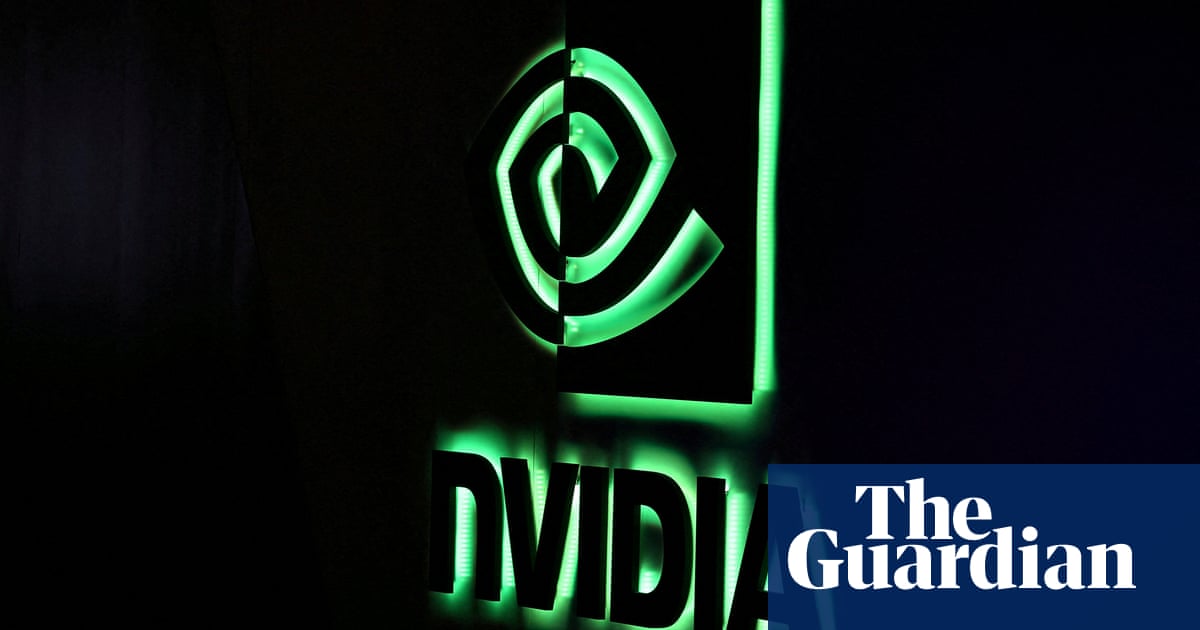Nvidia surpassed investor expectations for the fourth quarter of 2024 with a 78% jump in revenue year over year.
The company reported $39.3bn in revenue, beating analyst projections of $38.25bn. It also reported $0.89 in earnings a share on Wednesday, beating expectations of $0.84.
Investors were on the lookout during the chipmaker’s earnings call for signs of slowing demand for its semiconductors, a potential indication of an end to the AI-fueled market boom that has propelled the company to a stratospheric valuation of $3.1tn. Nvidia’s financials gave no such signal.
This earnings call was the first look at the company’s production and sales since China’s DeepSeek AI introduced an AI model that beat many of those made in the US while requiring a fraction of the training and investment. The introduction of DeepSeek initially sent Nvidia’s valuation tumbling by hundreds of billions because the Chinese AI seemed to show that new models did not necessarily need to rely on the company’s most expensive, top-of-the-line graphics processing unit (GPU), as most cutting-edge models out of the US do.
In his initial comments, the Nvidia CEO Jensen Huang said that appetite for Blackwell, the company’s top-of-the-line GPU, remained strong.
“Demand for Blackwell is amazing as reasoning AI adds another scaling law – increasing compute for training makes models smarter and increasing compute for long thinking makes the answer smarter,” said Huang. “We’ve successfully ramped up the massive-scale production of Blackwell AI supercomputers, achieving billions of dollars in sales in its first quarter. AI is advancing at light speed as agentic AI and physical AI set the stage for the next wave of AI to revolutionize the largest industries.”
While analysts expected Nvidia to maintain its leadership position as the maker of the AI industry’s favorite chips, recent news has presented new potential challenges to the company’s ownership of the market.
Most recently, analysts at TD Cowen published findings earlier in the week that Microsoft, one of Nvidia’s biggest customers, was cancelling leases with private data center operators. Investors expressed concerns about the sustainability of mass investment into AI infrastructure, including Microsoft’s $80bn, which would mean less spending on Nvidia’s wares.
Nevertheless, neither DeepSeek nor cancelled leases made an immediate impact on the company’s data-center revenue. Nvidia, which controls more than 90% of the market for graphics processing units (GPUs), reported a data-center revenue of $35.6bn for the final quarter of FY 2025. Wall Street had projected $34.09bn. The company also predicted it would bring in $43bn in revenue for the first quarter of fiscal year 2026.
Huang said DeepSeek has actually stoked enthusiasm for Blackwell because reasoning models, like the model that DeepSeek showcased, require 100 times more computing power, he said.
“We designed Blackwell for this moment,” he said.
Huang emphasized on the analysts call that the company expects demand for AI infrastructure to continue to grow as the technology continues to evolve. “Near-term, midterm and longterm” all signs point to increased demand, he said.
after newsletter promotion
“We’ve really only tapped consumer AI and search and some amount of consumer generative AI … the early days of software,” Huang said. “The next wave is coming. Agentic AI for enterprise, physical AI for robotics and sovereign AI as different regions build out their AI.”
Following the earnings report, analysts said Nvidia’s continued success was evidence that “market jitters over DeepSeek” have not materialized.
“Competitors are making strides but frontier models require the kind of advanced computing resources that Nvidia provides,” said Jacob Bourne, a technology analyst at eMarketer. “Blackwell generating ‘billions in sales’ validates Nvidia’s top position just as the market is expanding on the agentic and physical AI fronts. Short-term volatility is still on the horizon but Nvidia’s market command remains unmatched.”
But some analysts say market reactions have been neutral because the company is now expected to blow Wall Street projections out of the water.
“Nvidia’s latest quarterly sales are bigger than its entire annual revenue from just two years ago … but with the stock already reflecting sky-high growth expectations, investors were hoping for an even bigger beat,” said Jacob Falkencrone, global head of investment strategy at Saxo Markets. “Some analysts had anticipated a guidance figure north of $45bn and while Nvidia delivered strong numbers, it wasn’t the ‘blowout’ some were hoping for.”
The company also said it was still unclear how Donald Trump’s tariff proposals would impact its business.










